Development Dynamics
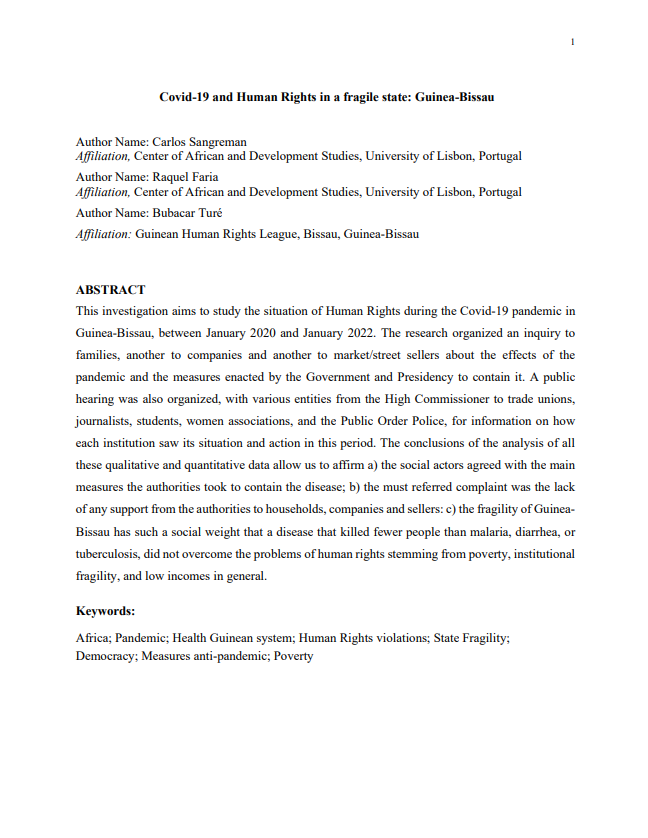
COVID-19 and Human Rights in a Fragile State: Guinea-Bissau
Abstract:
COVID-19 and Human Rights in a Fragile State: Guinea-Bissau aims to study the situation of Human Rights during the Covid-19 pandemic in Guinea-Bissau, between January 2020 and January 2022. The research organized an inquiry to families, another to companies and another to market/street sellers about the effects of the pandemic and the measures enacted by the Government and Presidency to contain it. A public hearing was also organized, with various entities from the High Commissioner to trade unions, journalists, students, women associations, and the Public Order Police, for information on how each institution saw its situation and action in this period. The conclusions of the analysis of all these qualitative and quantitative data allow us to affirm a) the social actors agreed with the main measures the authorities took to contain the disease; b) the must referred complaint was the lack of any support from the authorities to households, companies and sellers: c) the fragility of Guinea-Bissau has such a social weight that a disease that killed fewer people than malaria, diarrhea, or tuberculosis, did not overcome the problems of human rights stemming from poverty, institutional fragility, and low incomes in general.
Quotation:
Sangreman, C., Faria, R. T., & Turé, B. (2022). COVID-19 and Human Rights in a Fragile State: Guinea-Bissau. In P. Andrade, & M. Martins (Ed.), Handbook of Research on Urban Tourism, Viral Society, and the Impact of the COVID-19 Pandemic (pp. 341-360). IGI Global. https://doi.org/10.4018/978-1-6684-3369-0.ch018
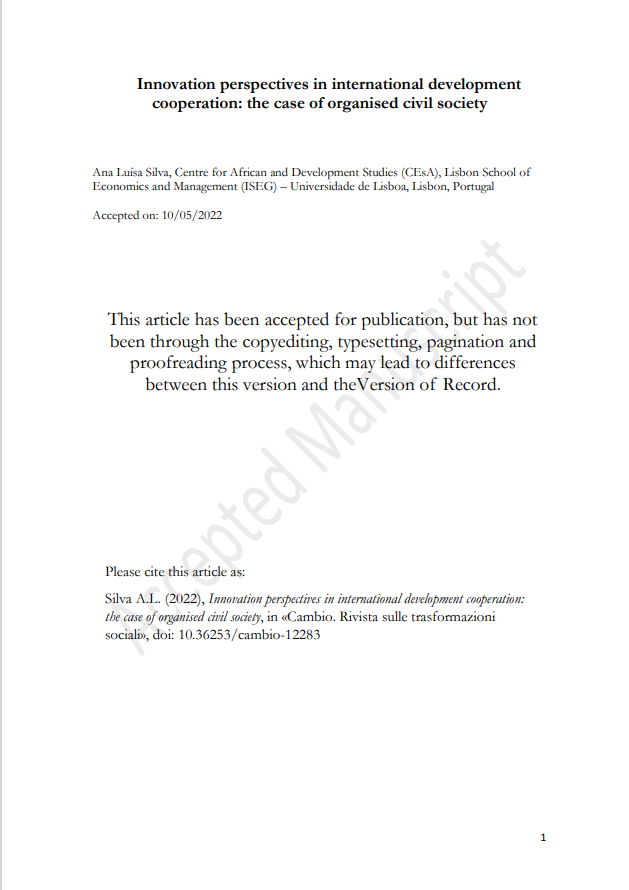
Innovation Perspectives in International Development Cooperation: The case of organised civil society
Abstract:
Non-governmental organisations (NGOs) are still in the side-lines of the emerging literature on innovation in international development cooperation, although the topic has been gaining prominence since the 2000s, accompanying the wider transformation of the development cooperation field. Innovation perspectives in international development cooperation: the case of organised civil society presents the results of a mixed methods research that involved a broad geographic sample of 20 NGO national co-ordinating bodies through an online survey and semi-structured interviews. The goal was to map and analyse innovation perspectives, motivations, and practices in these organisations, understand their relationship with mainstream views of innovation in the field and uncover their potential to promote inclusive innovation. Results suggest that these actors have potential to promote inclusive innovation practices in the field, since they approach innovation with social change as an end goal, as opposed to having an overly solutionist and problem-solving view of social innovation. The paper also highlights the key role of information and communications technologies, as well as digital tools, as both a reason to innovate and enablers of innovation in these organisations. Finally, the conclusion leaves questions open for further research on innovation in development NGOs.
Quotation:
Silva, A. L. (2022). Innovation perspectives in international development cooperation: the case of organised civil society. Cambio. Rivista Sulle Trasformazioni Sociali. https://doi.org/10.36253/cambio-12283
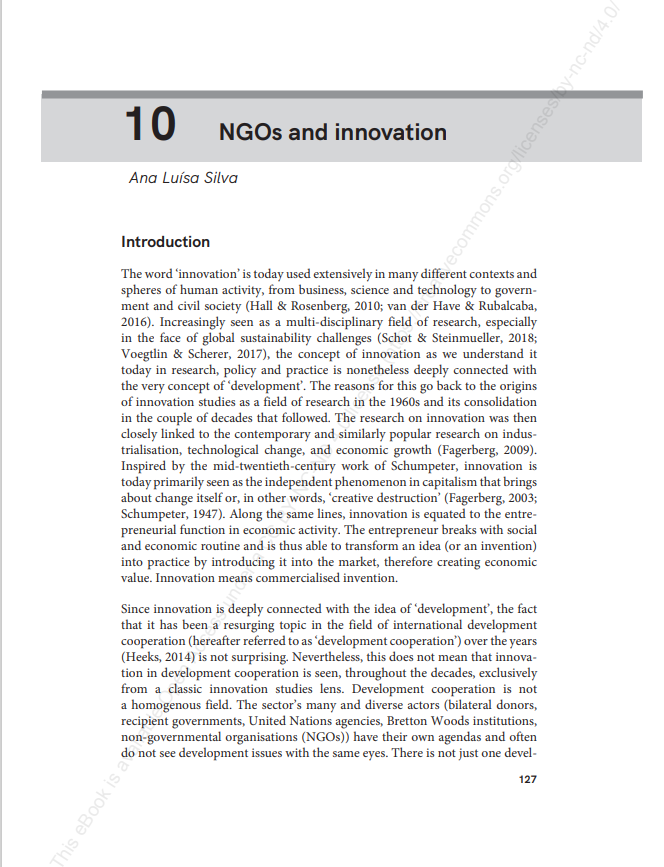
NGOs and Innovation
Abstract:
Over the past twenty years, and against the backdrop of a profound transformation in the international development cooperation sector, innovation has resurged as a ‘hot’ topic in the field. In the same period, development non-governmental organisations (NGOs) face growing challenges of legitimacy, accountability, and dependence on government funding. Their role as precursors of alternative development models, natural social innovators, and catalysts of international solidarity movements is increasingly being questioned. These challenges have been further exacerbated by the Covid-19 pandemic. Existing research on development NGO innovation focuses, like most classic innovation research in other fields, on studying specific, usually successful, innovations; leaving many questions unanswered on topics like innovation failure, processes, culture, funding, motivations, as well as the role of NGOs in innovation for development. This chapter, NGOs and Innovation, by Ana Luísa Silva, gives an overview of the state of the art on development NGOs and innovation, identifying areas that are open for further research. This article is inserted in A Research Agenda for Civil Society, a book by Kees Biekart and Alan Fowler.
Quotation:
Silva, A. L. (2022). NGOs and Innovation. In K. Biekart & A. Fowler (Ed.), A Research Agenda for Civil Society (pp. 127-142). Elgar Research Agendas. Edward Elgar. ISBN: 978 1 80037 814 8
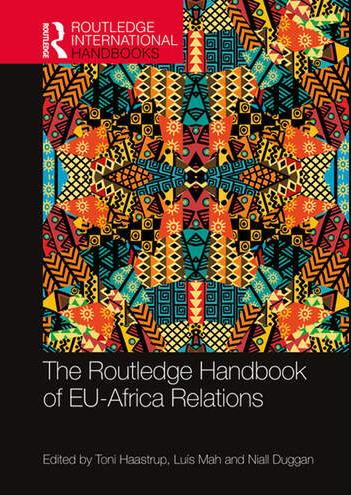
The Routledge Handbook of EU-Africa Relations
Abstract:
This handbook provides a comprehensive overview of the changing dynamics in the relationship between the African continent and the EU, provided by leading experts in the field. Structured into five parts, the book provides an incisive look at the past, present and potential futures of EU-Africa relations. The cutting-edge chapters cover themes like multilateralism, development assistance, institutions, gender equality and science and technology, among others. Thoroughly researched, this book provides original reflections from a diversity of conceptual and theoretical perspectives, from experts in Africa, Europe and beyond. The handbook thus offers rich and comprehensive analyses of contemporary global politics as manifested in Africa and Europe. This handbook will be an essential reference for scholars, students, researchers, policy makers and practitioners interested and working in a range of fields within the (sub)disciplines of African and EU studies, European politics and international studies. The Routledge Handbook of EU-Africa Relations, by Luís Mah (researcher for the Centre for African and Development Studies), Nial Duggan and Toni Haastrup is part of the mini-series Europe in the World Handbooks examining EU-regional relations and established by Professor Wei Shen.
Quotation:
Mah, Luís, Duggan, Nial & Haastrup, Toni (2021). The Routledge Handbook of EU-Africa Relations. Routledge. ISBN 9781315170916.
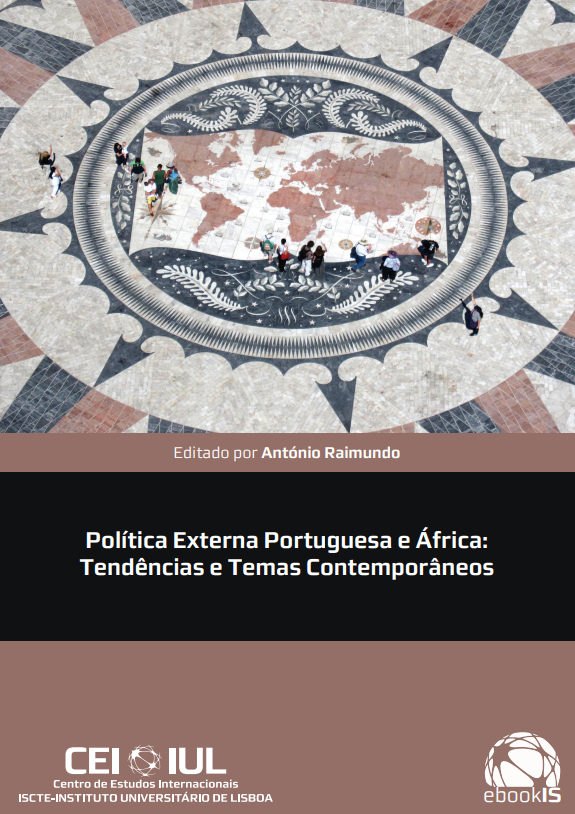
Portugal e o Bazar Africano: Mapeando trocas comerciais, fluxos de investimento e de ajuda ao desenvolvimento
Abstract:
Authored by Luís Mah, Portugal e o bazar africano: Mapeando trocas comerciais, fluxos de investimento e de ajuda ao desenvolvimento (with Rodrigo Ferreira do Amaral and Tcherno Baldé) is the fifth chapter of the e-book “Política Externa Portuguesa e África: Contextos e Tendências Contemporâneo” by A, Raimundo. In recent decades, Africa has gone from a ‘hopeless’ continent to an attractive and potential frontier market. The rapid economic changes in the region have benefited from new patterns of global engagement, involving emerging economies such as China or India. These developments have promoted increasing South-South cooperation, with several African countries seeking greater integration into the world economy. This chapter begins by analysing the current African economic context. Next, it explores how Portugal has developed its economic presence and cooperation on the continent since the mid-1970s, considering three indicators: trade, investment and development aid. Finally, the article assesses the challenges and opportunities for Portugal’s economic relations with Sub-Saharan Africa.
Quotation:
Mah, Luís (2019). Portugal e o bazar africano: Mapeando trocas comerciais, fluxos de investimento e de ajuda ao desenvolvimento (com Rodrigo Ferreira do Amaral e Tcherno Baldé) Em Política Externa Portuguesa e África: Contextos e Tendências Contemporâneo editado por António Raimundo, Lisboa: Centro de Estudos Internacionais, ISCTE-Instituto Universitário de Lisboa. ISBN 978-989-781-168-5. Cap. 5. pp. 121-139.

Contributo para uma leitura sobre práticas de cooperação para o desenvolvimento. O Projeto PAIPA implementado na Guiné-Bissau.
Abstract:
Contributo para uma leitura sobre práticas de cooperação para o desenvolvimento. O Projeto PAIPA implementado na Guiné-Bissau refers to an evaluation work of the Project to Support the Intensification of Food Production (PAIPA), a development cooperation project in the field of agriculture, included under the scope of Portuguese cooperation with Guinea-Bissau. The main objective was to construct an Evaluation focused on the intervention methodology designed for the implementation of the project, analysing the pathways, actions and resources mobilized to achieve the central objective of promoting the transition from traditional family-based agriculture in Guinea-Bissau to cash crop agriculture. The project documentation was analysed, interviews were conducted in Portugal and Guinea-Bissau with technicians and cooperation agents, local informants and PAIPA beneficiaries in the regions where the intervention took place. PAIPA was considered a successful project because it is based on respect for local specificities and is committed to the involvement of the target populations.
Quotation:
Frias, Sónia, (2019), “Contributo para uma leitura sobre práticas de cooperação para o desenvolvimento. O Projeto PAIPA implementado na Guiné-Bissau” in Alvarez, Teresa, Teresa Joaquim e Teresa Pinto (org.) Estudos sobre as Mulheres – conhecimentos itinerantes, percursos partilhados, Estudos sobre as Mulheres 1. Lisboa. CEMRI/UAberta. ISBN 978-972-674-863-2.
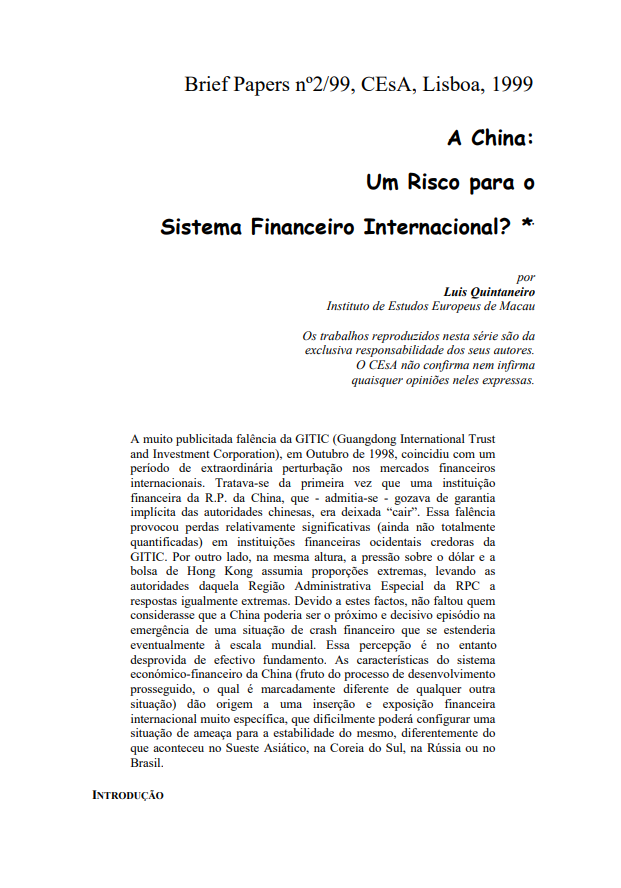
Brief Paper 2/1999: A China: Um risco para o sistema financeiro internacional?
Abstract:
The much publicized bankruptcy of G1T1C (Guangdong International Trust and Investment Corporation) in October 1998 coincided with a period of extraordinary turmoil in international financial markets. It was the first time that a financial institution in the R.P. of China, which – it was admitted – enjoyed an implicit guarantee from the Chinese authorities, was allowed to “fall”. This bankruptcy caused relatively significant losses (not yet fully quantified) in Western financial institutions creditors of GITIC. On the other hand, at the same time, the pressure on the dollar and the Hong Kong stock market was taking on extreme proportions, leading the authorities of that PRC Special Administrative Region to similarly extreme responses. Due to these facts, there was no lack of those who considered that China could be the next and decisive episode in the emergence of a situation of financial crash that would eventually extend to the world scale. This perception is, however, devoid of any real foundation. The characteristics of China’s economic and financial system (the result of the development process pursued, which is markedly different from any other situation) give rise to a very specific international financial insertion and exposure, which can hardly constitute a threat to stability of the same, unlike what happened in Southeast Asia, South Korea, Russia or Brazil. China: Um Risco para o Sistema Financeiro Internacional? was presented at the 1st Portugal – China Congress organised by the University of Trás-os-Montes e Alto Douro in Vila Real, 19-23 April 1999.
Quotation:
Quintaneiro, Luís. 1999. China: Um Risco para o Sistema Financeiro Internacional? Instituto Superior de Economia e Gestão – CEsA Brief papers nº 2-1999
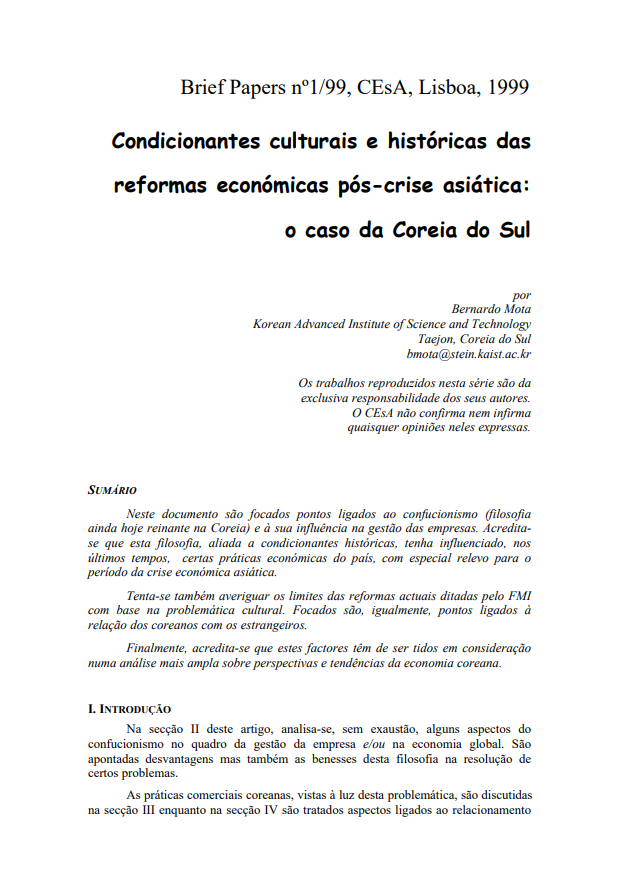
Brief Paper 1/1999: Condicionantes Culturais e Históricas das Reformas Económicas Pós-crise Asiática: O caso da Coreia do Sul
Abstract:
In Condicionantes Culturais e Históricas das Reformas Económicas Pós-crise Asiática: O caso da Coreia do Sul, we focus on Confucianism (a philosophy still prevailing in Korea) and its influence in the management of companies. It is believed that this philosophy, together with historical conditions, has influenced certain economic practices in the country in recent times, with special emphasis on the period of the Asian economic crisis. An attempt is also made to investigate the limits of the current reforms dictated by the IMF on the basis of cultural issues. It also focuses on the relationship between Koreans and foreigners. Finally, it is believed that these factors have to be taken into consideration in a broader analysis of prospects and trends in the Korean economy. It is believed that in an economic or financial analysis of the Korean (and Asian) crisis, its consequences and the outcome of reforms it is indispensable to take into account cultural and historical factors and social specificities. Confucianism is the most influential of these features. Some points of its influence on economic decision-making are reviewed. Certain Confucian features are believed to act as catalysts for economic recovery, and should not be completely dismissed as anachronistic. Korea could become a model of development, combining, in an original way, such divine variables as Confucianism, globalisation and economic liberalisation, on condition that a certain rigour in administration is introduced. Finally, I am convinced that a Confucian society is not incompatible with economic and democratic development in an increasingly global environment.
Quotation:
Mota, Bernardo. 1999. “Condicionantes culturais e históricas das reformas económicas pós-crise asiática : o caso da Coreia do Sul”. Instituto Superior de Economia e Gestão – CEsA Brief papers nº 1-1999
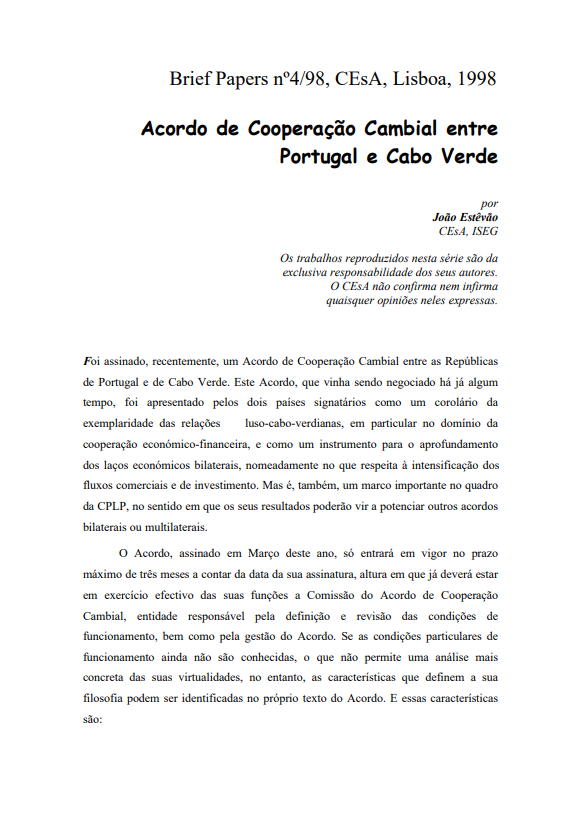
Brief Paper 4/1998: Acordo de Cooperação Cambial entre Portugal e Cabo Verde
Abstract:
An Exchange Cooperation Agreement was recently signed between the Republics of Portugal and Cape Verde. This agreement, which had been under negotiation for some time, was presented by the two signatory countries as a corollary to the exemplary nature of Luso-Cape Verde relations, especially in the area of economic and financial cooperation, and as an instrument for strengthening bilateral economic ties, especially as regards the intensification of trade and investment flows. But it is also an important milestone in the framework of the CPLP, in the sense that its results may come to enhance other bilateral or multilateral agreements. The Agreement, signed in March this year, will only come into force within a maximum of three months from the date it is signed, by which time the Exchange Cooperation Agreement Commission, the entity responsible for defining and reviewing the operating conditions, as well as for managing the Agreement, should already be performing its duties. If the specific operating conditions are not yet known, which does not allow a more concrete analysis of its virtualities, however, the characteristics which define its philosophy may be identified in the text of the Agreement itself. A summary of Acordo de cooperação cambial entre Portugal e Cabo Verde (Agreement on Exchange Rate Co-operation between Portugal and Cape Verde), entitled Moeda une Portugal e Cabo Verde (Currency unites Portugal and Cape Verde), was published in Informação Lusófona (UCCLA), no. 6, April 1998, p. 2.
Quotation:
Estêvão, João. 1998. “Acordo de cooperação cambial entre Portugal e Cabo Verde”. Instituto Superior de Economia e Gestão – CEsA Brief papers nº 4-1998.
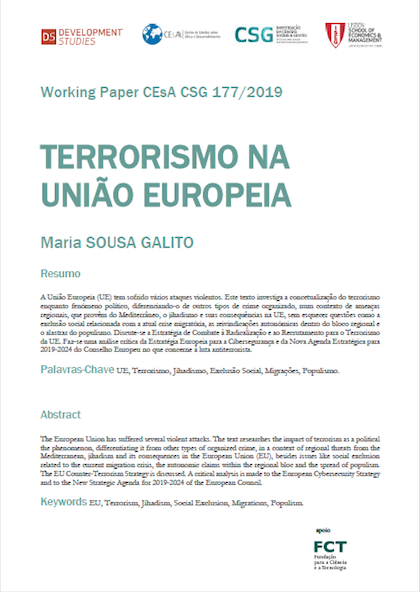
Working Paper 177/2019: Terrorismo na União Europeia
Abstract:
The European Union (EU) has suffered several violent attacks. Terrorismo na União Europeia investigates the conceptualisation of terrorism as a political phenomenon, differentiating it from other types of organised crime, in a context of regional threats, coming from the Mediterranean, jihadism and its consequences in the EU, without forgetting issues such as social exclusion related to the current migration crisis, autonomous claims within the regional bloc and the spread of populism. The EU Strategy for Combating Radicalisation and Recruitment to Terrorism is discussed. A critical analysis is made of the European Cybersecurity Strategy and the European Council’s New Strategic Agenda for 2019-2024 with regard to counter-terrorism. The idea is to confront legislative measures and to review precedents, within the framework of the Security Union and the Defence Union. The critical analysis of EU action is made on the basis of the challenges identified by the European Commission for the Community future, considering the Strategic Agenda 2019/2024, in a disruptive environment, in which the Community institutions have tried to be effective or even innovative and forerunners in terms of policy change.
Quotation:
Galito, Maria Sousa (2019). “Terrorismo na União Europeia”. Instituto Superior de Economia e Gestão – CEsA/CSG Documentos de Trabalho nº 177-2019.





